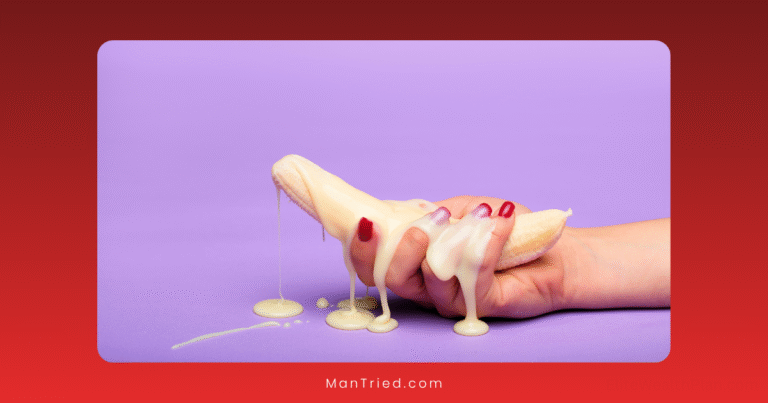The Performance Pressure Paradox: How Trying Harder Makes Things Worse

You’re in the bedroom with your partner. The mood is right, but your mind is racing. “I need to perform well,” you think. “I can’t let them down.” As you focus intensely on performing, something strange happens—the harder you try, the worse things get. Your body tenses, your arousal fades, and the intimate connection you were hoping for slips away.
This frustrating experience isn’t limited to the bedroom. From public speaking to athletic competition to workplace productivity, we’ve all encountered situations where our desperate attempts to perform well actually sabotage our success.
Welcome to the performance pressure paradox—the counterintuitive reality that trying harder often makes things worse.
The Science Behind the Paradox
The Yerkes-Dodson Law: When Pressure Helps vs. Hurts
In 1908, psychologists Robert Yerkes and John Dodson discovered something fascinating: performance and arousal (or pressure) have an inverted U-shaped relationship. A certain amount of pressure improves performance—this explains why deadlines can boost productivity and why some athletes perform better during important games.
However, beyond an optimal point, additional pressure causes performance to deteriorate rapidly. This explains why even seasoned performers choke under extreme pressure.
According to Dr. Sian Beilock, cognitive scientist and author of Choke: What the Secrets of the Brain Reveal About Getting It Right When You Have To, “When the pressure rises, we start worrying about the situation, our performance, and what others will think of us. These worries rob us of brainpower needed to succeed.”
The Paradoxical Brain: Why Your Control Center Gets Hijacked
When you desperately try to perform well, several neurological processes work against you:
- Working Memory Overload: Your prefrontal cortex—responsible for complex thinking and decision-making—becomes overwhelmed with self-monitoring thoughts, leaving fewer cognitive resources for the task itself.
- Sympathetic Nervous System Activation: The “fight-or-flight” response triggers adrenaline and cortisol release, which is helpful for escaping predators but detrimental for tasks requiring fine motor control or creative thinking.
- Explicit vs. Implicit Processing: Skills you’ve mastered (like driving or typing) normally operate on “autopilot” through implicit memory systems. Under pressure, you shift to explicit, step-by-step monitoring—essentially regressing to novice-level performance.
A 2023 study published in the Journal of Experimental Psychology found that participants who were told their performance would be evaluated showed a 37% decrease in fine motor skills compared to those performing the same task without evaluation pressure.
The Sexual Performance Pressure Trap
Nowhere is the performance pressure paradox more evident than in human sexuality. Research published in the Journal of Sexual Medicine indicates that up to 25% of men and 16% of women regularly experience performance anxiety during sexual encounters.
The Cycle of Sexual Performance Anxiety
Sexual performance anxiety creates a self-reinforcing cycle:
- Pressure: You feel pressure to perform well sexually (achieve erection, last long enough, experience orgasm, please your partner)
- Hypervigilance: This pressure causes you to monitor your body’s responses and your partner’s reactions
- Distraction: This monitoring distracts you from erotic sensations and emotional connection
- Physiological Interference: Your sympathetic nervous system activates, restricting blood flow to genital tissues
- Performance Difficulties: Sexual response becomes difficult or impossible
- Increased Anxiety: The experience reinforces fears about future encounters
- More Pressure: The cycle begins again, often with intensified pressure
Dr. Barry McCarthy, sex therapist and author of Coping with Erectile Dysfunction, explains: “The greatest enemy of good sexual function is not aging, medical problems, or relationship conflicts—it’s performance anxiety and the demand to function.”
The Spectatoring Phenomenon
Pioneering sex researchers Masters and Johnson identified a phenomenon called “spectatoring,” where individuals mentally step outside their bodies to observe and evaluate their sexual performance. This self-observation creates a disconnect from physical sensations and emotional connection—precisely the elements needed for satisfying sexual experiences.
In a 2022 study published in the Archives of Sexual Behavior, researchers found that participants who reported higher levels of spectatoring experienced significantly lower sexual satisfaction and more difficulties with arousal.
Beyond the Bedroom: The Paradox in Other Domains
The performance pressure paradox extends far beyond sexuality, affecting numerous areas of life:
The Workplace Paradox
Research from Stanford University shows that productivity declines sharply after 50 weekly work hours, with no additional output beyond 55 hours. Despite this, many professionals push themselves to work longer, resulting in diminished performance, impaired decision-making, and burnout.
A 2025 study of tech professionals found that those who took regular breaks and limited work to 40 hours weekly produced 23% more high-quality code than those working 60+ hour weeks.
The Athletic Choking Phenomenon
Even elite athletes fall victim to the paradox. When the stakes are highest, overthinking can disrupt the automatic execution of well-practiced skills. This explains why professional basketball players sometimes miss crucial free throws despite making thousands in practice.
Sports psychologist Dr. Jim Taylor notes, “The athletes who succeed under pressure aren’t those who try harder—they’re those who have learned to let their training take over while maintaining loose, relaxed focus.”
The Creative Block
Artists and writers often experience creative blocks when facing deadlines or high expectations. The pressure to produce brilliant work activates self-critical thinking that interferes with the spontaneous, associative thinking necessary for creativity.
Author Elizabeth Gilbert addresses this in her book Big Magic, suggesting that creative work flows best when approached with curiosity and playfulness rather than desperate determination.
Breaking Free: Strategies to Overcome the Paradox
The good news? Once you understand the performance pressure paradox, you can implement strategies to overcome it. Here are evidence-based approaches:
1. Embrace Process Over Outcome
Shifting focus from results to process dramatically reduces performance pressure. Instead of fixating on “I must satisfy my partner” or “I need to close this deal,” focus on “I will stay present and connected” or “I will communicate clearly.”
How to practice: Before any high-pressure situation, identify 2-3 process goals you can control, rather than outcome goals that depend on external factors.
2. Develop a Pre-Performance Routine
Consistent routines help bypass overthinking by activating automatic behavioral sequences. This is why athletes have pre-shot routines and performers have pre-show rituals.
How to practice: Create a simple 2-3 minute routine to use before high-pressure situations. For sexual encounters, this might include deep breathing, a brief body scan to release tension, and setting an intention to focus on connection rather than performance.
3. Use Mindfulness to Combat Spectatoring
Mindfulness—the practice of non-judgmental present-moment awareness—directly counteracts the self-monitoring that undermines performance.
How to practice: When you notice yourself spectatoring or overthinking, gently redirect attention to sensory experiences. During sex, focus on physical sensations, sounds, and emotional connection. During work tasks, focus on the specific details of what you’re doing rather than evaluating your progress.
A study published in the Journal of Sexual Medicine found that an 8-week mindfulness program reduced sexual performance anxiety by 42% compared to a control group.
4. Reframe Physiological Arousal
The physical symptoms of anxiety (racing heart, butterflies, sweaty palms) are nearly identical to excitement. Research from Harvard Business School shows that simply relabeling anxiety as “excitement” can improve performance.
How to practice: When you notice anxiety symptoms, tell yourself “I’m excited” rather than “I’m nervous.” This subtle reframing helps your brain interpret arousal as helpful rather than harmful.
5. Implement Strategic Incompletion
Perfectionism fuels the performance pressure paradox. Deliberately leaving tasks slightly unfinished can reduce perfectionist tendencies and keep your brain engaged rather than overwhelmed.
How to practice: For creative or complex tasks, end work sessions in the middle of a section rather than at completion points. This creates an “open loop” in your mind that maintains engagement without triggering perfectionist pressure.
6. Adopt Self-Compassionate Self-Talk
Self-criticism intensifies performance pressure, while self-compassion reduces it. Research from Dr. Kristin Neff shows that self-compassion—treating yourself with the same kindness you’d offer a good friend—enhances resilience and performance.
How to practice: When you notice self-critical thoughts (“I’m not good enough,” “I’m disappointing my partner”), replace them with self-compassionate alternatives (“This is challenging for many people,” “I’m doing my best in this moment”).
7. Create Psychological Safety
Performance pressure intensifies when we fear judgment or rejection. Creating environments of psychological safety—where mistakes are viewed as learning opportunities rather than failures—reduces harmful pressure.
How to practice: Have open conversations with partners, teammates, or colleagues about expectations and the counterproductive nature of performance pressure. Establish agreements to focus on growth and enjoyment rather than flawless execution.
Case Study: Transforming Sexual Performance Anxiety
To illustrate these principles in action, consider James’s experience:
James, 34, had developed significant anxiety about maintaining erections during sexual encounters. The more he worried about his performance, the more frequently he experienced difficulties. Each “failure” intensified his anxiety about future encounters, creating a vicious cycle.
Working with a sex therapist, James implemented several strategies:
- Process shift: Instead of focusing on maintaining an erection, he focused on staying present and connected with his partner
- Sensate focus: He and his partner practiced non-goal-oriented touch exercises to reduce performance pressure
- Mindfulness training: He learned to recognize when his mind shifted into “spectatoring” mode and practiced returning to physical sensations
- Communication: He had honest conversations with his partner about his anxiety, which reduced the pressure to “perform” perfectly
- Self-compassion: He practiced responding to difficulties with kindness rather than self-criticism
After three months, James reported significantly reduced anxiety and improved sexual function. More importantly, he described sex as “enjoyable again” rather than “a test I might fail.”
His therapist noted: “James’s improvement came not from trying harder to perform well, but from learning to let go of performance pressure altogether. This paradoxical approach—caring less about performance to perform better—is key to overcoming sexual anxiety.”
The Paradoxical Path Forward
The performance pressure paradox presents us with a fascinating truth: sometimes the path to better performance requires less effort, not more. By understanding the psychological and neurological mechanisms that cause increased effort to backfire, we can adopt more effective approaches to performing under pressure.
Whether in the bedroom, boardroom, or athletic field, the principles remain the same: Focus on process over outcome, stay present rather than self-evaluating, cultivate self-compassion, and remember that the goal isn’t perfection but engagement and growth.
As Zen teacher Shunryu Suzuki wisely noted: “In the beginner’s mind there are many possibilities, but in the expert’s mind there are few.” Perhaps the secret to overcoming the performance pressure paradox lies in reclaiming some of that beginner’s mind—approaching our most important activities with curiosity and openness rather than desperate determination.
The next time you feel yourself trying harder only to perform worse, remember: Sometimes the most productive thing you can do is take a deep breath, loosen your grip, and trust the capabilities you’ve already developed. Your body and mind often know what to do, if only you’ll get out of their way.
Have you experienced the performance pressure paradox in your life? Share your experiences and strategies in the comments below.






